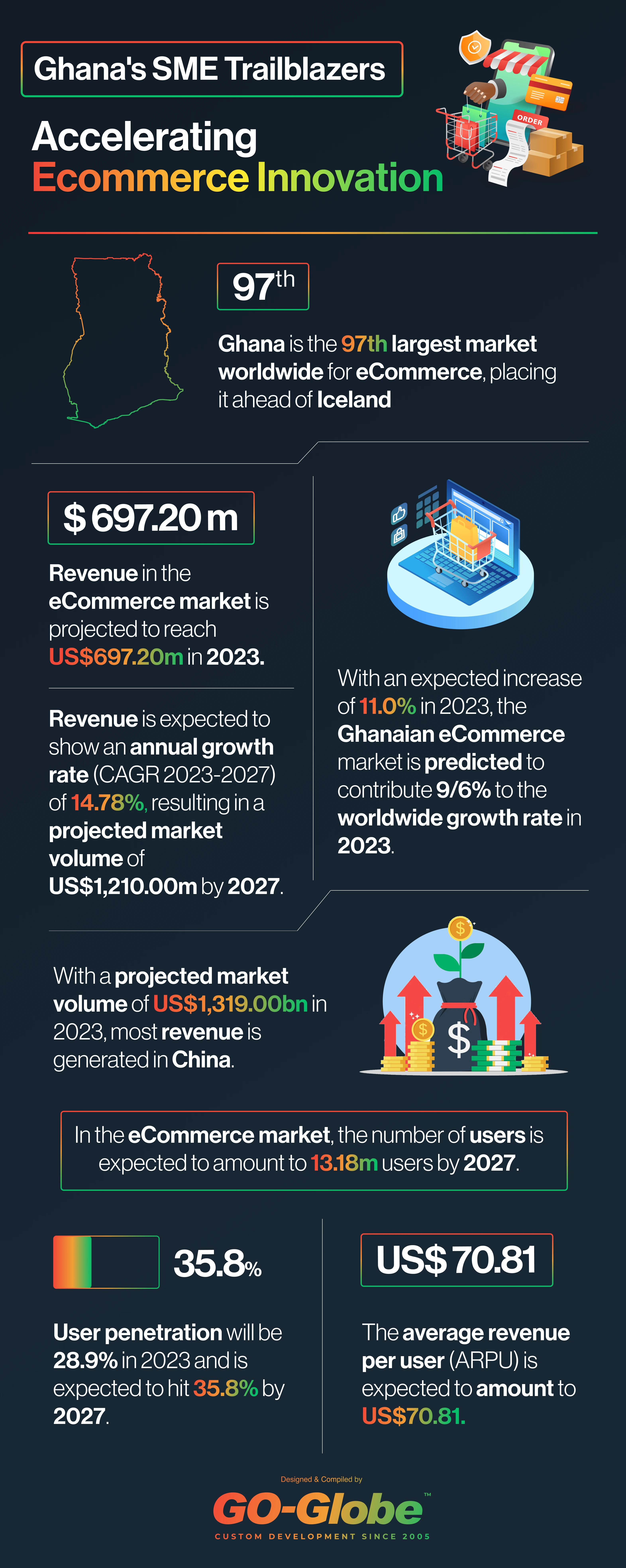Abstract
In recent years, Ghana's small and medium-sized enterprises (SMEs) have emerged as true trailblazers in the realm of ecommerce innovation. These enterprising businesses are harnessing the power of technology and creativity to redefine how commerce is conducted in the country. From leveraging digital platforms to embracing unique marketing strategies, Ghana's SMEs are at the forefront of driving economic growth and reshaping the business landscape. In this article, we delve into the inspiring stories and strategies of these SME trailblazers, exploring how they are propelling ecommerce innovation in Ghana.
Table of Contents
1. Introduction
2. The Rise of Ecommerce in Ghana
3. SMEs Pioneering Ecommerce Transformation
3a. Empowering Artisans through Online Marketplaces
3b. Revolutionizing Agribusiness with Digital Solutions
4. Innovative Digital Marketing Strategies
4a. Social Media Storytelling: From Products to Journeys
4b. Influencer Collaborations: Bridging Trust and Visibility
5. Overcoming Challenges and Building Trust
5a. Logistical Challenges: Navigating Delivery and Distribution
5b. Cultivating Customer Trust in Online Transactions
6. Collaboration and Knowledge Sharing
6a. Ecommerce Forums and Community Networks
6b. Government Initiatives Fostering SME Growth
7. The Future Landscape of Ghanaian Ecommerce
8. Conclusion
Introduction
In a nation known for its rich cultural heritage and vibrant markets, a digital revolution is underway. Ghana's SMEs, ranging from traditional artisans to agribusiness entrepreneurs, are rapidly adapting to the digital age and capitalizing on ecommerce opportunities. As these SMEs carve their niches in the online marketplace, they are redefining how consumers interact with products and services.

Infographics by GO-Globe Ghana
The Rise of Ecommerce in Ghana
The proliferation of smartphones and increased internet connectivity have laid the foundation for Ghana's ecommerce boom. As more Ghanaians gain access to digital devices, the traditional brick-and-mortar shopping experience is evolving into a digital-first approach. This shift is enabling SMEs to reach a broader audience and participate in the global marketplace.
SMEs Pioneering Ecommerce Transformation
Empowering Artisans through Online Marketplaces
Artisans, who have been the backbone of Ghana's craft industry, are finding new avenues to showcase their creations. Online marketplaces provide these artisans with a platform to display and sell their handcrafted goods, connecting them directly with consumers both locally and internationally.
Revolutionizing Agribusiness with Digital Solutions
Ghana's agricultural sector is also undergoing a transformation through ecommerce. Farmers and agripreneurs are leveraging digital platforms to streamline the distribution of fresh produce, eliminate intermediaries, and reduce wastage. This not only benefits the farmers but also ensures that consumers receive quality produce at competitive prices.
Innovative Digital Marketing Strategies
Social Media Storytelling: From Products to Journeys
Ghanaian SMEs are embracing storytelling as a powerful tool to engage customers. Instead of just promoting products, businesses are sharing their journeys, values, and behind-the-scenes stories on social media. This personalized approach fosters a deeper connection with customers, turning them into brand advocates.
Influencer Collaborations: Bridging Trust and Visibility
Collaborating with local influencers has become a cornerstone of many SMEs' marketing strategies. These influencers help bridge the gap between brands and consumers by endorsing products and providing authentic reviews. This approach not only boosts visibility but also establishes trust in the online shopping experience.
Overcoming Challenges and Building Trust
Logistical Challenges: Navigating Delivery and Distribution
While ecommerce offers vast opportunities, it also presents logistical challenges. Timely and efficient delivery can be a hurdle for SMEs, especially those operating in remote areas. However, innovative solutions such as crowdsourced delivery networks and third-party logistics providers are helping overcome these challenges.
Cultivating Customer Trust in Online Transactions
Building trust in online transactions is paramount for the success of ecommerce. SMEs are employing various strategies such as secure payment gateways, transparent return policies, and customer reviews to instill confidence in buyers. These efforts are crucial for overcoming the initial skepticism associated with online purchases.
Collaboration and Knowledge Sharing
Ecommerce Forums and Community Networks
Collaboration among SMEs is pivotal for knowledge sharing and growth. Ecommerce forums and online communities provide a space for entrepreneurs to exchange ideas, discuss challenges, and offer solutions. This collaborative environment fosters innovation and supports the overall development of the ecommerce ecosystem.
Government Initiatives Fostering SME Growth
The Ghanaian government has recognized the potential of SMEs in driving economic growth. Various initiatives and policies are being implemented to support and promote ecommerce among small businesses. These measures include financial incentives, digital literacy programs, and regulatory reforms.
The Future Landscape of Ghanaian Ecommerce
As Ghana's SMEs continue to pioneer ecommerce innovation, the future holds exciting possibilities. With advancements in technology, increased digital literacy, and a growing customer base, SMEs are poised to play an even more significant role in shaping the country's economic landscape.
Conclusion
Ghana's SMEs are rewriting the narrative of traditional commerce by embracing ecommerce and leveraging innovative strategies. Their stories of resilience, adaptation, and success inspire others to follow suit. As ecommerce continues to evolve, these trailblazing SMEs will undoubtedly remain at the forefront, driving innovation and transforming Ghana's business landscape.
Tags:
Gulf News